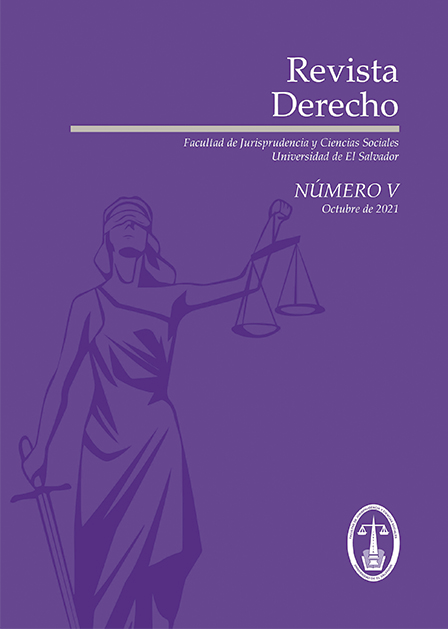Treatment of the specialty principle (lex especialis derogat legi generali) and the preventive regime of antinomies in the administrative procedures law
Keywords:
Antinomies, Administrative Procedures Law, Normative contradictionAbstract
This is a study on the principle of specialty, according to which, in cases of contradiction between a prior special rule and a subsequent general rule, the former prevails. Consequently, this universal principle of law operates as a criterion for the solution of normative antinomies or contradictions. For this reason, some general aspects of antinomies are developed, such as their definition, requirements, identification criteria, classes of antinomies and the rules or criteria for their solution. But the interest of this paper is to discover how the Administrative Procedures Law (LPA) treats this principle and the possible antinomies that may arise from the entry into force of the former. The main finding is that the LPA establishes a “Preventive Regime of Double-Sided Antinomies”: On the one hand, as a general rule, it establishes the express derogation, nominative or innominate, of previous laws or special rules that contradict the LPA; and, on the other hand, as an exception, it imposes the express prevalence of certain special rules. This regime is complemented by the “Mandate for the Correction of Antinomies with Prevalence of the LPA”, established in its article 166, which obliges state institutions to adapt to the LPA the norms of any nature that regulate the different administrative procedures that may be incompatible with the provisions of said law.
Downloads
References
Arvizu Ibarra, Carmen Hortensia. Conflictos normativos: Las Antinomias en el Sistema jurídico mexicano: Su ubicación en la Formación del Abogado, http://www.juridicaformativa.uson.mx/memorias/iv_coloquio/doc/MesaJuridicoFormativa/CarmenHortenciaArvizuI.pdf, acceso el 23 de julio de 2020.
Bobbio, Norberto. Teoría dell´ ordinamento giuridico (Torino: Giappiceli, 1960) 90.
Bulygin, E. Incompletezza: contraditorietá e indeterminatezza degli ordinamenti normativi, Logica deontica y semantica (a cura di G. di Bernardo), (Bologna: Il Mulino, 1977) 291.
Centro de Información Jurídica en Línea de la Universidad de Costa Rica (CIJUL), Derogatoria de leyes, 36, acceso el 23 de julio de 2020, https://cijulenlinea.ucr.ac.cr/2013/derogatoria-de-leyes/
Ezquiaga Ganuzas, Francisco Javier. Conflictos normativos e interpretación jurídica, Colección cuadernos de divulgación sobre cultura de la legalidad, no. 2, (Michoacán: Tribunal Electoral del Estado de Michoacán, 2010), 13.
García Máynez, Eduardo. Introducción a la lógica jurídica (Buenos Aires: Fondo de la Cultura Económica, 1951), 32.
Guevara Arroyo, Alejandro. “Discrecionalidad de los tribunales constitucionales en la aplicación de principios jurídicos: un análisis realista”, en Revista Ius Doctrina, vol. 11, No. 2 (2018). http://revistas.ucr.ac.cr/index.php/iusdoctrina
Henríquez Viñas, Los jueces y la resolución de antinomias desde la perspectiva de las fuentes del derecho constitucional chileno, 462.
Iturralde Sesma, Victoria. “Una aproximación al tema de las antinomias normativas: problemas relativos a la identificación de las mismas”, en Anuario de Filosofía del Derecho (nueva época), no. 4, Madrid, (1987): 332.
Ley de Procedimientos Administrativos (El Salvador: Asamblea Legislativa de El Salvador, 2018).
Miraut Martín, Laura. “Apuntes para una consideración del concurso de normas como modificación del sistema jurídico”, en Revista de Ciencias Jurídicas, N°8, Gran Canaria: Universidad de Las Palmas (1997): 24
Morgental, Leopold. Les Antinomies en Droit (Bruselas: Ch. Perelman, 1965) 39.
Pietro Sanchíz, Luis. “Observaciones sobre las antinomias y el criterio de ponderación”, en Cuadernos de Derecho Público, No. 11 (2010): 10.
Ross, Alf. Sobre justicia y derecho, (t. G. Carrió) (Buenos Aires: Editorial Universitaria de Buenos Aires,1963).
Sala de lo Constitucional, Sentencia de Amparo, Referencia: 71-2002 (El Salvador: Corte Suprema de Justicia, 2015)
Sala de lo Constitucional, Sentencia de Inconstitucionalidad, Referencia: 34-2011/55-2011 (El Salvador: Corte Suprema de Justicia, 2011), 6.
Sala de lo Constitucional, Sentencia de Inconstitucionalidad, Referencia: 121-2007 (El Salvador: Corte Suprema de Justicia, 2007).
Sala Primera de la Corte Suprema de Justicia de Costa Rica, Sentencia 130 de las catorce horas con treinta minutos del veintiséis de agosto de mil novecientos noventa y dos. Expediente: 92-000130-0004-CA.
Sanchíz, Pietro. Observaciones sobre las Antinomias y el Criterio de Ponderació.
Tardío Pato, El principio de especialidad normativa (Lex specialis) y sus aplicaciones jurisprudenciales.
Zorrilla, Conflictos Normativos, Enciclopedia de Filosofía y Teoría del Derecho, vol. 2, Universidad Autónoma de México (Ciudad de México: Instituto de Investigaciones Jurídicas, 2015), 1315.
Downloads
Published
Issue
Section
License
Copyright (c) 2021 Revista Derecho

This work is licensed under a Creative Commons Attribution-NonCommercial 4.0 International License.
The authors transfer the copyright rights in favor of the Faculty of Jurisprudence and Social Sciences of the University of El Salvador (through Aequus Editorial) to include their writing in Revista Derecho.








